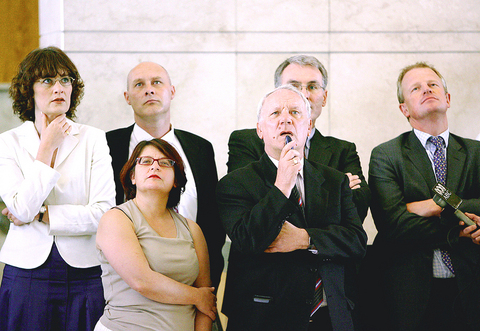Australia's government yesterday achieved a decade-old dream and privatized telco behemoth Telstra with a US$12 billion share offer that was snapped up by enthusiastic investors.
Shares in the third tranche of the sale rose nine percent against the first instalment price when they debuted on the Australian Stock Exchange as Canberra shed 35 percent of its 51.8 percent stake in the formerly state-owned firm.
But Telstra's overall share price fell 3.2 percent as investors sold off their existing stock to buy into the government's new offer, which will leave it with a 17 percent state in Telstra.

PHOTO: AFP
The new shares opened their listing at A$2.11 and closed at a high of A$2.18, compared to the US$2 first instalment price paid by small or retail investors and the A$2.10 paid by institutions.
"[Telstra] finally has fulfilled its ambition to be more truly independent of government and no longer part of a government enterprise," said BBY analyst Mark McDonnell told the Australian Broadcasting Corporation.
Australian Finance Minister Nick Minchin hailed the success of the sale saying that the government could now play its role of regulator in the telco industry without fear of a conflict of interest.
Telstra would also be better off now that the government was no longer a substantial shareholder, he said.
"It has a been a huge load on the company for too long and at last the company is free of that weight upon it of the government's majority shareholding," he said.
"So in my view all Telstra shareholders will be much better off," the minister added.
The opening price for the new offer was a nice reward for long-suffering shareholders in Telstra who have seen the value of the stock decline by more than 30 percent since July 2005 as the government pushed towards privatization, analysts said.
"It was up about five percent for individual investors who bought at A$2 dollars so that's a nice little reward for long-suffering shareholders," said Austock Brokers senior client adviser Michael Heffernan.
The sale came a day after the government announced that unexpected enthusiasm for the Telstra sale had nearly doubled the value of an expanded government float to A$15.5 billion dollars (US$11.9 billion).
Minchin said on Sunday that retail investors would pay a total of A$3.60 a share and institutional investors A$3.70 for 4.25 billion shares -- up from the 2.15 billion shares originally on offer.
Yesterday's partial float -- the second-biggest sale in Australian corporate history -- is known as T3 because it is the third tranche of Telstra shares offered after T1 in 1997 and T2 in 1999, which brought in A$16 billion.
But some stockbrokers said the lower Telstra shares did not augur well for investors who were counting on making a stag profit yesterday on the sale of their new securities in Australia's biggest telco.

AIR SUPPORT: The Ministry of National Defense thanked the US for the delivery, adding that it was an indicator of the White House’s commitment to the Taiwan Relations Act Deputy Minister of National Defense Po Horng-huei (柏鴻輝) and Representative to the US Alexander Yui on Friday attended a delivery ceremony for the first of Taiwan’s long-awaited 66 F-16C/D Block 70 jets at a Lockheed Martin Corp factory in Greenville, South Carolina. “We are so proud to be the global home of the F-16 and to support Taiwan’s air defense capabilities,” US Representative William Timmons wrote on X, alongside a photograph of Taiwanese and US officials at the event. The F-16C/D Block 70 jets Taiwan ordered have the same capabilities as aircraft that had been upgraded to F-16Vs. The batch of Lockheed Martin

GRIDLOCK: The National Fire Agency’s Special Search and Rescue team is on standby to travel to the countries to help out with the rescue effort A powerful earthquake rocked Myanmar and neighboring Thailand yesterday, killing at least three people in Bangkok and burying dozens when a high-rise building under construction collapsed. Footage shared on social media from Myanmar’s second-largest city showed widespread destruction, raising fears that many were trapped under the rubble or killed. The magnitude 7.7 earthquake, with an epicenter near Mandalay in Myanmar, struck at midday and was followed by a strong magnitude 6.4 aftershock. The extent of death, injury and destruction — especially in Myanmar, which is embroiled in a civil war and where information is tightly controlled at the best of times —

China's military today said it began joint army, navy and rocket force exercises around Taiwan to "serve as a stern warning and powerful deterrent against Taiwanese independence," calling President William Lai (賴清德) a "parasite." The exercises come after Lai called Beijing a "foreign hostile force" last month. More than 10 Chinese military ships approached close to Taiwan's 24 nautical mile (44.4km) contiguous zone this morning and Taiwan sent its own warships to respond, two senior Taiwanese officials said. Taiwan has not yet detected any live fire by the Chinese military so far, one of the officials said. The drills took place after US Secretary

THUGGISH BEHAVIOR: Encouraging people to report independence supporters is another intimidation tactic that threatens cross-strait peace, the state department said China setting up an online system for reporting “Taiwanese independence” advocates is an “irresponsible and reprehensible” act, a US government spokesperson said on Friday. “China’s call for private individuals to report on alleged ‘persecution or suppression’ by supposed ‘Taiwan independence henchmen and accomplices’ is irresponsible and reprehensible,” an unnamed US Department of State spokesperson told the Central News Agency in an e-mail. The move is part of Beijing’s “intimidation campaign” against Taiwan and its supporters, and is “threatening free speech around the world, destabilizing the Indo-Pacific region, and deliberately eroding the cross-strait status quo,” the spokesperson said. The Chinese Communist Party’s “threats